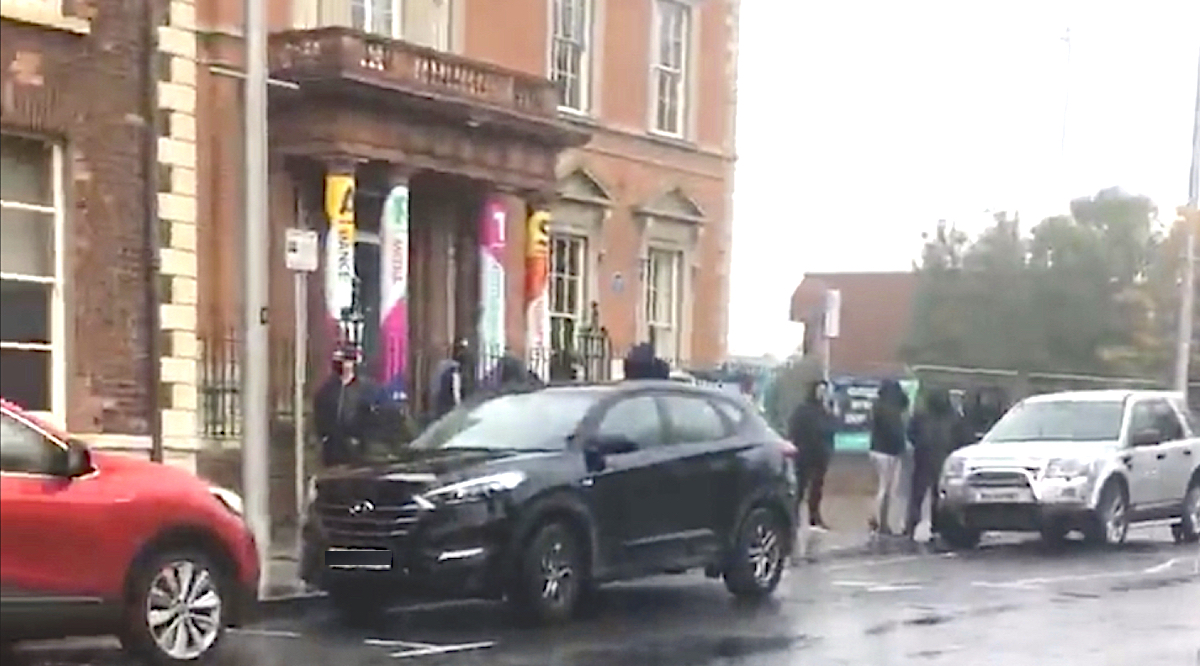
A Six County election appears set to be called on Friday as the DUP, the main unionist party, continues to boycott the power-sharing institutions of the Good Friday Agreement.
Although Ministers technically remain in their posts, the Stormont administration has functioned in name only since the end of January.
Both the Dublin and London governments have continued to urge the DUP to end their boycott in order to avoid an election. In the absence of another resolution of the deadlock, a return to the polls is required under legislation introduced in February to improve political stability at Stormont.
A scheduled election in May was won by Sinn Féin and should have seen the party’s Michelle O’Neill historically installed as First Minister. Her victory was blocked by the DUP and, despite their protests over the Irish protocol of Brexit, their refusal to accept the rise of nationalism is a key motivation behind their rejection of powersharing now.
The 26 County Taoiseach Micheál Martin this week called on the DUP to ‘honour the mandate’ of the last election, while British Direct Ruler Chris Heaton-Harris said that it is “a legal requirement” to call the election at one minute past midnight on Friday. Heaton-Harris said the DUP had a “choice” and encouraged them to take the “opportunity to come back in”, apparently referring to ongoing talks over the Protocol.
Sinn Féin vice president Michelle O’Neill said the “clock is ticking”, but that her “number one priority is the restoration of the Executive, that should also be the Secretary of State’s priority.”
The Assembly meets on Thursday at noon – 12 hours before the deadline – in a last-ditch attempt to form an Executive.
An opinion poll published this week shows majority support for the Protocol, with 63% believing it offers the North unique opportunities, while just 30% support the DUP boycott.
But regardless of the Brexit stalemate, cost of living issues are likely to dominate any election, with inflation running well above 10% and both sides of the community struggling with the cost of food and fuel.
Meanwhile, there is growing public concern that loyalist paramilitaries are driving the DUP’s hardline stance. On Saturday, a polite cost-of-living protest outside the office of DUP leader Jeffrey Donaldson was confronted by a paramilitary-style gang of masked men (pictured).
The small protest in Lisburn on was organised by ‘Progressive Politics NI’, but intimidation by those in loyalist paramilitary-style clothing forced the event to move some distance away. Protestors carried on with the demo, holding signs aloft with slogans such as “The Democratic Unionist Party aren’t being very democratic” and “they get paid while we get played”.
The chair of a coalition of loyalist paramilitary groups has also spoke out for the DUP this week to condemn Heaton-Harris for “ranting” at the DUP over the election requirement. ‘Loyalist Communities Council’ (LCC) chair David Campbell insisted an “election will further galvanise unionism around the DUP”.
Campbell then delivered a bizarre rant of his own, calling for the Dublin government to “apologise for their deliberate misrepresentation of the [Good Friday] Agreement... during the Brexit negotiations”.
The PSNI have admitted that loyalist paramilitaries were involved in anti-protocol protests cited by the DUP to justify their hardline stance. Last year, paramilitary violence followed several protests against the Protocol, with rioting in April and further disturbances in November.
There are also growing questions over the DUP’s regular meetings with UVF-linked blogger Jamie Bryson, one of the main organisers of loyalist protests. Bryson insisted this week he speaks to Jeffrey Donaldson on a weekly basis, that the pair exchange information about the anti-protocol campaign, and that he also briefs UVF figures.
On Wednesday, Donaldson denied taking instruction from Bryson or other loyalists and insisted that the DUP ‘has its own decision-making processes’.
![[Irish Republican News]](https://republican-news.org/graphics/title_gifs/rn.gif)
![[Irish Republican News]](https://republican-news.org/graphics/title_gifs/harp.gif)

